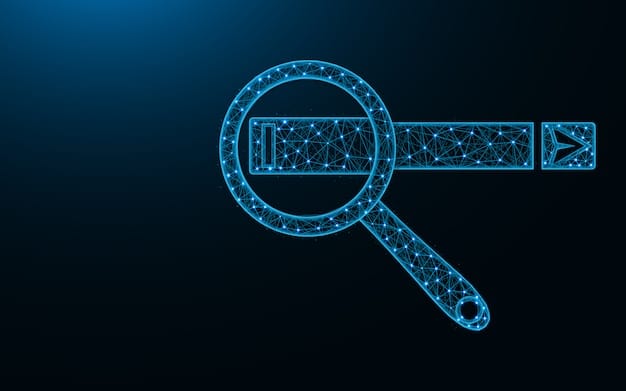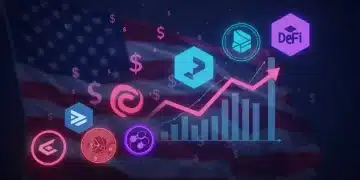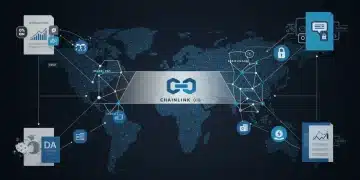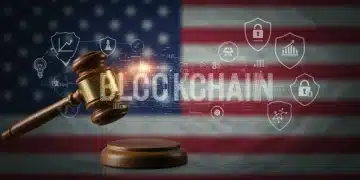DeFi Smart Contracts: Auditing and Security for US Users

DeFi smart contracts require rigorous auditing and security measures to protect US users from vulnerabilities and exploits, ensuring a safer and more reliable decentralized finance ecosystem.
Decentralized Finance (DeFi) is revolutionizing the financial landscape, and DeFi Smart Contracts: Auditing and Security Best Practices for US Users are paramount to its success, especially for US investors navigating this innovative space.
Understanding the Importance of DeFi Smart Contract Audits
DeFi smart contracts are the backbone of decentralized finance, automating financial agreements on the blockchain. However, their immutability means that vulnerabilities can lead to significant financial losses, making thorough audits essential. Understanding why these audits are so critical is the first step towards ensuring a secure DeFi experience for US users.
What are DeFi Smart Contracts?
DeFi smart contracts are self-executing agreements written in code and deployed on a blockchain. They handle everything from lending and borrowing to automated market making. Because they are automated and immutable, careful planning and security are very important.
Why Audits are Necessary
Audits act as a comprehensive risk assessment. They not only identify vulnerabilities but also ensure compliance with security standards. A well-conducted audit can prevent exploits and safeguard user funds, ultimately fostering trust in the DeFi platform.

Consequences of Neglecting Audits
- Financial Losses: Exploits can lead to loss of funds for users and the platform.
- Reputational Damage: Loss of trust compromises user loyalty and adoption.
- Regulatory Scrutiny: Non-compliance attracts unwanted attention from regulatory bodies.
In conclusion, understanding the necessity of DeFi smart contract audits is the first and probably the most important step toward ensuring the safety of users, especially in the US where regulations are becoming more stringent.
Key Areas Covered in a DeFi Smart Contract Audit
A DeFi smart contract audit is a thorough review of the code to identify vulnerabilities and ensure it works as intended. These audits generally cover various areas and aspects of the code’s functioning, compliance, and security. Understanding what is analyzed is important to making sure appropriate measures are taken to guarantee the safety of user funds.
These are the main areas that are thoroughly reviewed in a DeFi smart contract audit:
- Code Review: Source code assessment to discover errors, vulnerabilities, and inefficiencies.
- Functional Testing: Verifying that the contract functions as documented and designed.
- Gas Optimization: Finding ways to reduce gas consumption for improved efficiency.
- Security Analysis: Identifying potential exploits, like reentrancy attacks and integer overflows.
Code Quality and Structure
Auditors assess the clarity, maintainability, and efficiency of the code. Contracts with well-organized code and clear documentation are easier to verify and less prone to errors.
Vulnerability Assessment
This assessment involves actively looking for potential weaknesses in the contract, such as those related to access controls, arithmetic errors, or outdated dependencies. Tools and manual review work together to provide a full perspective.
Compliance Validation
For US users, it’s important to make sure the smart contract complies with local laws. Auditors check to make sure the contracts follow relevant legal and market standards. This gives an extra layer of safety.
Choosing the Right Audit Firm for Your DeFi Project
Choosing the right audit firm is a crucial step in guaranteeing the security and dependability of your DeFi project. A thorough audit can find flaws and vulnerabilities that, if left unchecked, could result in large financial losses and reputational damage. So, choosing an audit team that aligns with your project’s needs and goals is very important.
Evaluating Experience and Expertise
Look for firms with a proven track record in auditing DeFi smart contracts. Assess their expertise in identifying vulnerabilities and their understanding of common exploits. Don’t focus on just any security firm; ensure they specialize in blockchain and DeFi.
Checking for Certifications and Reputation
Certifications like Certified Information Systems Auditor (CISA) indicate a level of professional competence. Also, research the reputation of the firm within the DeFi community. Look for reviews, case studies, and testimonials from other projects.
Testing Methodologies and Tools
A reliable firm offers a mix of manual code review and automated testing. They use tools like static analyzers, fuzzers, and formal verification to cover all aspects of security. Make sure their method is well-rounded and up-to-date.

Consider these insights when you’re selecting an audit firm, ensuring that your project gets a comprehensive and reliable security assessment.
Common Vulnerabilities in DeFi Smart Contracts
DeFi smart contracts, while innovative, are prone to certain vulnerabilities that can be exploited by attackers. Understanding these common weaknesses is critical for ensuring the security of your DeFi project. US users should be particularly aware of these threats to protect their investments and keep funds safe.
Reentrancy Attacks
A reentrancy attack occurs when a contract calls another contract before updating its state, allowing the called contract to make recursive calls back to the original contract. Here’s additional information about why preventing reentrancy attacks are so important.
Integer Overflow/Underflow
Integer overflow/underflow happens when an arithmetic operation exceeds the maximum or minimum value that a variable can hold. This can lead to unexpected behavior and security breaches.
Timestamp Dependence
Relying on timestamps for critical logic can make smart contracts subject to manipulation and exploitation. Attackers can manipulate block timestamps to gain an advantage.
By knowing the common vulnerabilities, developers and users can take more precautions and apply security measures to reduce their risk.
Best Practices for Secure DeFi Smart Contract Development
Developing secure DeFi smart contracts requires following a set of best practices from planning to deployment. These practices can significantly minimize vulnerabilities and safeguard user funds. US developers should be diligent in implementing these strategies to ensure the integrity and reliability of their DeFi projects.
Use Established Security Patterns
Security patterns are proven solutions to common security problems. Using these patterns reduces the risk of introducing new vulnerabilities.
Keep Contracts Simple and Modular
Simple contracts are easier to understand and review. Modular design helps isolate bugs and makes updates easier. Complex contracts have a higher chance of getting exploited, so it is best to separate functions.
Regular Security Audits and Testing
Regular audits and tests ensure that issues are caught early. Security should be an ongoing process, not a one-time task.
- Static Analysis: Performing automated checks to identify potential vulnerabilities.
- Dynamic Analysis: Running tests to see how the smart contract performs in different scenarios.
- Formal Verification: Using formal methods with mathematical proofs to verify the correctness of the contract.
By adhering to these best practices, developers can improve the security of their DeFi smart contracts.
Regulatory Landscape for DeFi in the US
The regulatory landscape for DeFi in the US is still developing, but US users must stay informed of the changing guidelines to ensure compliance and minimize risks. Navigating this evolving environment requires an understanding of how existing regulations might apply to DeFi activities, as well as awareness of potential new rules that might impact DeFi projects.
Current Regulations and Guidelines
Existing regulations, like securities laws and anti-money laundering (AML) rules, may apply to certain DeFi activities. The SEC and FinCEN have signaled that they are closely monitoring DeFi and will enforce these laws where applicable. US users need to be aware of tax laws so they can pay their taxes appropriately.
Future Regulatory Trends
Future regulatory trends could include more specific rules for DeFi, potentially impacting token issuances, lending platforms, and decentralized exchanges (DEXs). Compliance will get more important as rules get clearer. This shows how important it is to stay aware of the changing regulations.
Impact on US DeFi Users
Increased regulatory scrutiny could lead to greater compliance requirements for DeFi platforms, impacting how US users interact with them. AML checks, KYC processes, and reporting requirements may become more commonplace. The regulatory changes will affect users throughout the entire DeFi space.
| Key Aspect | Brief Description |
|---|---|
| 🛡️ Audit Importance | Audits identify vulnerabilities, ensuring contract safety and compliance. |
| 👨💻 Secure Coding | Following best practices such as modular design and established patterns is very important. |
| 🏛️ Regulatory Awareness | Staying informed on U.S. DeFi regulations protects users and ensures compliance. |
| 🔍 Vulnerability Checks | Regularly checking for vulnerabilities like reentrancy attacks prevents exploits. |
Frequently Asked Questions
A DeFi smart contract audit is a comprehensive review of the contract’s code to identify vulnerabilities, bugs, and security flaws. It ensures the contract functions as intended and is free from potential exploits.
Audits play a very important role by adding trust, protecting investments, and adhering to an increasing number of rules that are being created. The extra care keeps the users safe by preventing any exploitation.
DeFi smart contracts should be audited before deployment and after any significant updates or changes to the code. Regular audits are essential to maintaining security.
Common vulnerabilities include reentrancy attacks, integer overflows/underflows, timestamp dependence, and gas limit issues. These can be exploited by attackers to manipulate the contract.
US users can check if the platform has undergone audits by reputable firms, review the audit reports, and stay informed about the platform’s security practices and updates. It is always important to stay informed.
Conclusion
In conclusion, ensuring the security of DeFi smart contracts through rigorous audits and adherence to best practices is paramount, especially for US users navigating this rapidly evolving landscape. The evolving guidelines being created for compliance and risk-mitigation are important parts to the safety of future DeFi projects.





